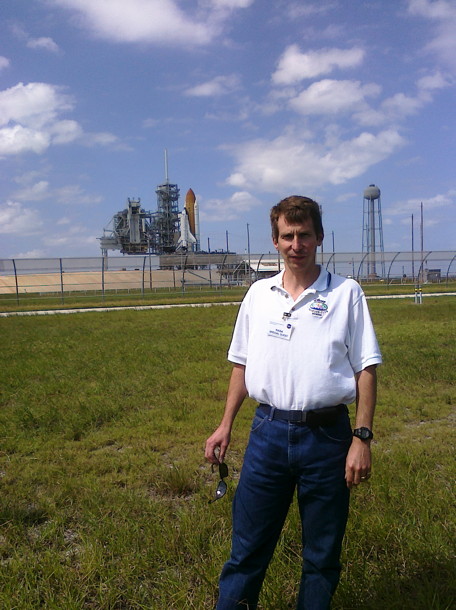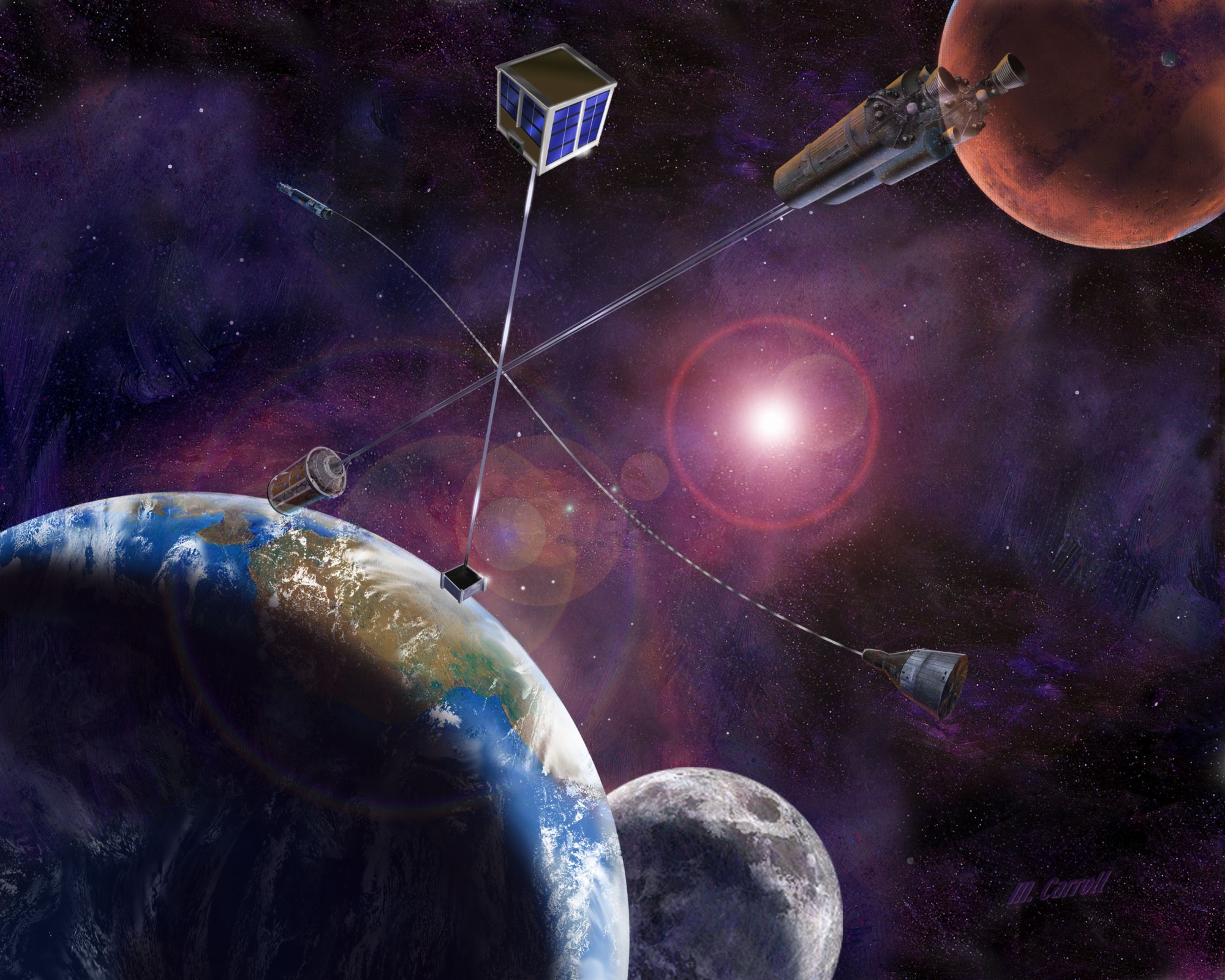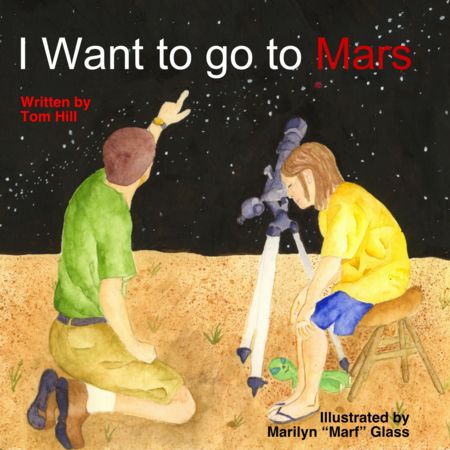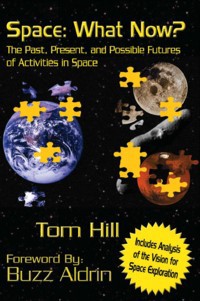|
|
 |
|
Here's the latest on space, and my opinions on it... This is the legacy site, with blog
entries from November, 2004 through June, 2011. Updates after June 9, 2011 can be found at http://spacewhatnow.com/SWN
|
 |
|
|
Monday, November 28, 2005
Maintaining the PR Blitz
Burt Rutan is featured in another space.com article. Most of it rehashes things I've heard him say before, but one new item that I hadn't seen
before caught my eye, although it's not in the quote from him portion: Flight paths of his commercial spaceship
can include over-the-ocean travel, gliding above California to a desert landing, Rutan said. "We applaud when you stop on
the runway. The NASA folk applaud when they clear the tower on takeoff," he said. It looks like I may have misinterpereted
it. I read it as "flights crossing the ocean" instead of "flights originating from CA, flying over the ocean for a short
period, then landing back in CA." I still want to see it happen.
Sunday, November 27, 2005
Harry Potter and the International Space Station
Looks like Harry Potter and the Goblet of Fire is the first movie out in the theaters that's been beamed up to the space station. According to the press release, the ISS has a nice DVD collection, but this is the first time a movie's been sent up electronically. This will become a
common occurence once we're flying people to Mars, without regular resupply missions. For now, it's a cool novelty, and a
good idea that people are thinking about how to do it.
Thanksgiving Reporting
MSNBC has an article talking about what Thanksgiving feasters have to look forward to on Mars. There's a picture of an ISS astronaut tending
plants on the station, and lots of talk about how the crew will have to grow their own food.
While it's true that eventually a crew on Mars' surface will have to grow their own vegetables, it isn't a valid approach
for the first mission to do so as part of their required rations. The first mission will probably bring a test greenhouse
along and try to grow some plants, but they likely won't have the plantable area to supply anything more than some spices
and a fresh tomato at times. There are also a lot of variables, such as knowing what fertilizers we need to use so we can
grow things in Mars' soil.
In the article, the author mentions that food for the ISS astronauts wouldn't last for the time required for a Mars mission.
That may be true, but it's also irrelevant-ISS food doesn't need to last that long because the station receives resupply
runs many times a year. Food can easily be made to last 3 years.
There's no doubt, we have a ways to go before we send people to Mars, but first, we'll have to get our reporting of such activities
straightened out.
6:19 am est
They're Going to, They Didn't, They Did!
There's a saying that the first reports out of a combat situation are invariably wrong. Well, I'm starting to think that
about the Japanese Space Agency. Earlier, I talked about their reports of a landing that probably didn't happen. It turns out that the probe actually did land that
day, but it didn't collect its sample. Now, reports say (with a really cool picture) that the craft has landed and done what it was supposed to do. Congrats to the Japanese! Next
time, please be a little less confusing with your press releases. People tend to remember spacecraft failure news better
than they remember success news later.
Ugh. I wrote the post before reading the article. There are some escape clauses in it like "apparently succeeded in landing
on an asteroid and collecting surface samples Saturday." Looks like we'll only know for sure when the capsule returns.
Update: The craft may be leaking fuel.
Monday, November 21, 2005
It's got Graphics, but Does it Have Legs?
SpaceDev has released another study...this one on flights to the moon. The related article reports that lunar missions can be done for under $10B. The press release has additional information (be sure to note the disclaimer at the bottom about "forward-looking statements", risks, and assumptions).
One of those assumptions would have to deal with a much-lower cost to launch cargo into orbit. Not to worry, they have an idea for that, too. Note the previous disclaimer duplicated at the bottom of the page.
One of the more interesting ideas they bring up is a "rocket chair" which is essentially a seat with rockets and propellant
tanks attached to it. The idea appears to be minimal-mass personnel transfer, with a passenger (who would also have to be
the pilot, unless they're assuming a lot of automation) riding on the craft in a spacesuit. My first thought is that I'd
like to have a little more covering me than a spacesuit in a landing on the moon. Before everyone brings it up, I know that
something similar was proposed in the Gemini program.
8:09 pm est
Sunday, November 20, 2005
Without bad Luck..?
Would the Japanese have any luck at all? Their asteroid craft has taken pictures of its own shadow, but can't seem to get landed. This article describes the craft's landing status as "undetermined" which is never a good thing, although the craft appears to be OK at
this point.
This is starting to remind me of their Mars Probe, which, after a series of setbacks, was silenced in the end.
Saturday, November 19, 2005
Mockup Being Built
Well, it's a step past Powerpoint(tm) engineering, but we'll see how much momentum it'll build. Found this article on CEV mockup work in Houston.
There's a great sequence in From the Earth to the Moon showing the design process used for the lunar module. That film was the first thing I thought of seeing the article.
Friday, November 18, 2005
Supply Depots Coming into Vogue?
NASA Administator Mike Griffin had some things to say about space commercialization. One topic he brought up in particular was Orbital Depots.
Tuesday, November 15, 2005
No Book Signing on Saturday
I got a call from Air&Space. The order for their stock of my books wasn't processed properly, so the book signing will
be rescheduled. I'll still be around for part of the day doing Discovery Stations.
7:55 pm est
In Memoriam
My father (pictured to the right) died on the 13th of November. He was 75 years old. A longtime smoker diagnosed with lung
cancer in July, he tried chemotherapy until his body could no longer take it. Then, he came home under Hospice care and faced
his final days with his wife and sons.
My Dad was an engineer without the schooling. He could walk in a pressroom and know what was wrong with a machine just by
the sound it made, then go home to design and build a replacement part for installation and install it on the late shift.
Robert W. Hill will be laid to rest in Dillsbug, Pennsylvania on Thursday morning, November 17th. The funeral home's web
page can be found here, while his obituary, with the opportunity to sign the guestbook is here.
No postings until at least Friday.
Monday, November 14, 2005
Book Signing at Air and Space Museum
I avoided posted this because of events that were outside my control. I will be at The National Air and Space Museum on the 19th of November, as part of their Family Day for SpaceShipOne. My tentative schedule includes:
- 10-10:50 - Discovery Station (likely Touch a Falling Star in the Explore The Planets Gallery)
- 11-11:30 AM - Book Signing, Location TBA - Delayed, New Date/Time TBA
- 12-1 - Discovery Station (likely Living and Working in Space (near Apollo-Soyuz) or Telescope Power! (in Exploring the
Universe))
- 1:30-2 - Book Signing, Location TBA - Delayed, New Date/Time TBA
Saturday, November 12, 2005
D'ooh?
Space.com reports that MINERVA, the Japanese microlander, was deployed from the Hayabusa space probe. This article says the lander may not have landed, however. I wonder if the spring was wound too tight and sent the little probe
away?
Seems a bit Tenuous to me
This article refers to a new proposed method for shifting the orbit of an asteroid. In it, the spacecraft in question would hover
above the surface of the space flotsam and thrust away from it. The asteroid would then move based on gravitational
attraction between the asteroid and the spacecraft. There would be a force exerted by the spacecraft on the asteroid,
but in my mind that force would be vanishingly small. The article discusses canting spacecraft engines away from the
space rock to prevent exhaust from cancelling out the effort, and as I envision it, only a couple particles from the
exhaust would be necessary to negate it all.
Symbiotes...in...Space!
It looks like lichen can survive in space. This is cool stuff. Apollo 12, with its retrieval of Surveyor 3's camera as well as other missions such as the Long Duration Exposure Facility proved that bacteria can survive in space, but this experiment is the first deliberate test I've heard of exposing this
type of life form to space intentionally. The article describes how the conditions on Mars are more forgiving than those
in space, so this test shows that life on the surface of the red planet may be possible. In their descriptions of radiation
(including ultra-violet), vacuum, and water content, it's true that Mars' conditions are more hospitable, but there's one
item they gloss over, in the chemical make-up of Mars' soil. According to Viking data, the soil is rich in
peroxides. A separate test is required to determine if lichen can survive that exposure.
This entry got me thinking about panspermia and the oxygenation of the atmosphere. According to this history of Earth's atmosphere, we're now enjoying Earth's third surface gas collection. There are indications that life existed in the second atmosphere,
and most of that life was driven underground when oxygen arrived. I haven't heard a mechanism proposed for how the early,
non-oxygen producing bacteria changed into the later oxygen-producing form, but a delivery of lichen, arriving on a meteor,
could fit the bill.
Lunar Politics
According to this article, Apollos 16 and 17 almost met a political end in the Nixon White House. Apparently, it was considered politically disastrous to have an
Apollo mission fail in the lead-up to an election. One option discussed was cancelling both of the last missions to
the Moon. Of course, these were the missions where the exploration of the moon was really getting into high gear, so
their loss would have been tragic. Cooler heads prevailed, however, and Apollo 16 went off because it took place early
enough in 1972 and wasn't considered too much of a problem. Apollo 17 was delayed into December, however, where it could
only effect an inauguration mood.
Of course, breaking into offices and then lying about what happened during a campaign are also politically disastrous,
but we have no indications that delay or cancellation of such action was considered.
Mars...Through the Years
The Hubble Space Telescope had its vision cleared in 1993. Since then, it's pointed its wondrous eye at Mars each
time the fourth rock from the sun made its close approach to our planet. The result is this beautiful mosaic.
Sunday, November 6, 2005
Asteroid Update
5:44 pm est
Moon in 2017, and Perfect Fuel With Nowhere to Burn it
Reuters found a Chinese scientist willing to say that they (the Chinese) will land on the moon by 2017. I'm sure it's a coincidence (ha!) that the date is one year before
the US announced date of 2018. According to the article, they're going to the moon for: The project also includes
setting up a moon-based astronomical telescope, measuring the thickness of the moon's soil and the amount of helium-3 on the
moon -- an element some researchers say is a perfect, non-polluting fuel source. OK, a moon-based astronomical
telescope is a good use for the moon. I'm not sure what they're getting at in measuring the thickness of the lunar soil,
but it's the last item I'm most interested in. Helium-3 is found in relative abundance on the moon, and it has the potential
to be a "perfect fuel." The problem comes in that we have no place to use the "perfect fuel" yet. Helium-3 would be used
in fusion reactors, but I haven't seen any fusion reactors around. In fact, the term doesn't even appear in the Reuter's
article, while a more thoroughly-researched article would have pointed out the problem in the argument. Perhaps, the Chinese
are presupposing that fusion reactors will exist in 2017. If that's the case, it would have been a nice fact to include in
the article. More likely, they're enjoying the press attention they garner every time they mention they're going to do something
in space.
9:40 am est
Thursday, November 3, 2005
A Bright Flash, but no Serious Interest
Halloween night was fairly typical in the suburban DC area this year, with one twist. South of the city, a large fireball
erupted, with a brightness reported to be equal to that of the full moon. Other stories here and here. I didn't see it personally (though, in the first linked article, they mention an earlier light in the sky and I may have
seen that), but someone who did see it said it stayed bright in the sky for on the order of 10 seconds. That's pretty impressive,
but not impressive enough to draw interest to the asteroid threat. Now, if we had a car-sized object entered the atmosphere
and detonated over DC, as Pete Worden talked about happening a few years ago over The Mediteranean, with some broken glass and minor property damage, that may
have gotten some more attention. Perhaps even another Congressional hearing.
In a related story, NASA told The B612 Foundation that the agency feels it's OK to wait until after 2013 before mounting any sort of effort to track Apophis. Their rationale is that we'll get time to gather more tracking data in the meantime, and this article covers it.
Wednesday, November 2, 2005
Pluto + 3 Moons - Express!
Cool news from Pluto via Hubble. Looks like our first-discovered member of the Kuiper Belt has 3 moons now. Luckily, we have a spacecraft gearing up for the trip, and that little craft will haul. This article talks about New Horizons crossing the moon's orbit nine hours after launch and whipping by Jupiter 13 months after
launch. Voyager 2 took 23 months.
8:52 pm est
|
|
|
 |
|
|
|
 |
|
Space: Search Now! with Google
| Tom and Discovery |

|
| Taken During a Tour of KSC on 6 Oct 2010 |
| TEMPOł Update |

|
| Click on the picture to go to the Mars Society TEMPOł Page |
| Solar System Ambassadors |

|
| Click on the image above to see Tom's SSA profile |
Email Comments to tom [at]
spacewhatnow.com
| Latest book! Click on the cover to purchase |

|
| I Want to go to Mars is a picture book for beginning readers |
More information on I Want to go to Mars can be found in the devoted section of this web site.
Join the Space:What Now? email list for updates on book events or articles published by the author. Email
addresses will not be shared.
I kind of wrote this off, thinking I was being spammed, but I'd like to know if people are really signing up. Please enter
the text you see below in the second line, and I'll get a warm, fuzzy feeling that people are actually reading and signing
up for mail!

| Now Available! |

|
| Clicking here will take you to purchasing options for SWN |
| Get your SWN Gear! |
|
|
| Powered by CafePress |
|
 |
|
|
|
|
|
Scotty
The Updated Past, Present and Possible Futures of Space Activity
|
|
|
 |

